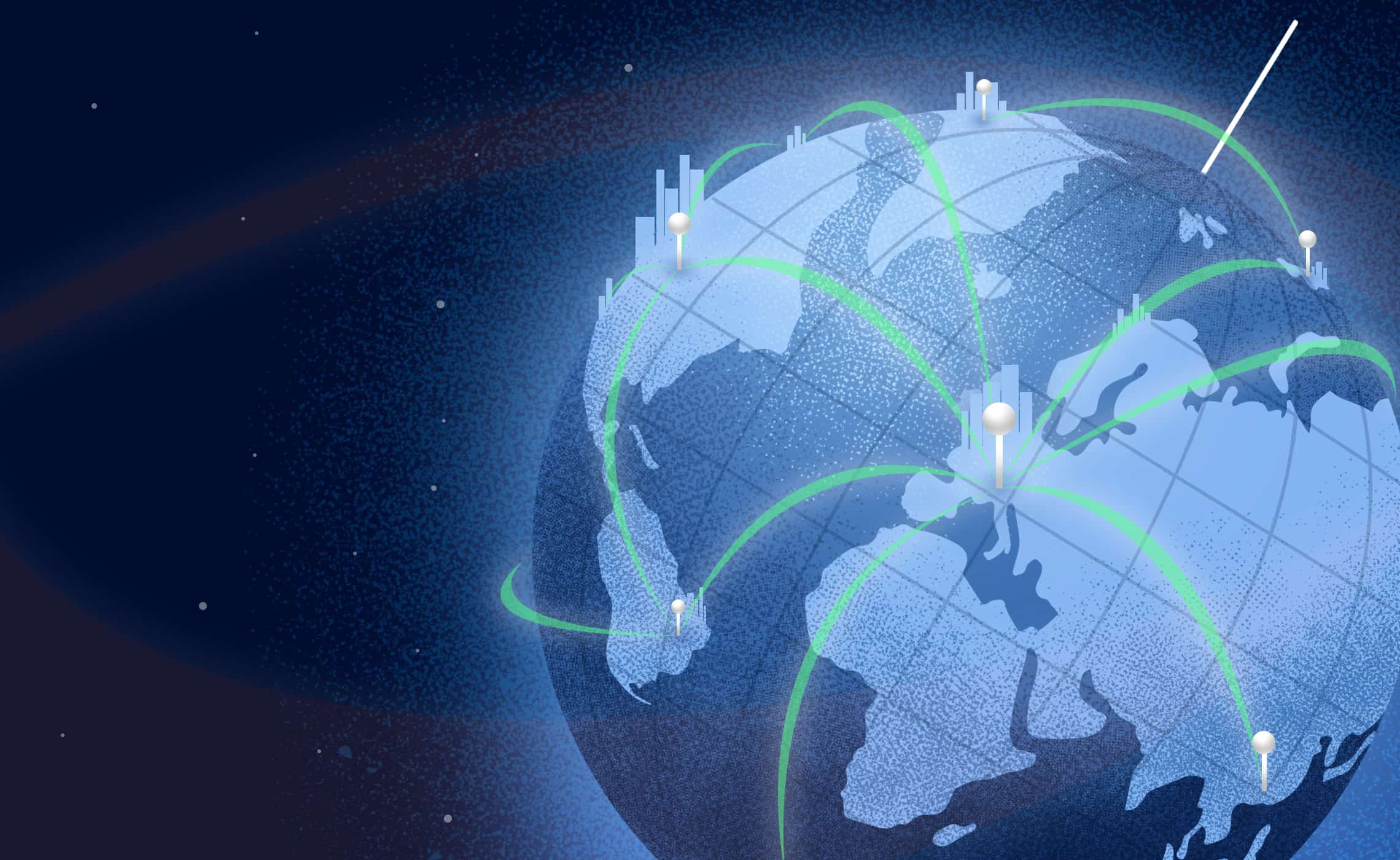B2B and B2C: Differences and Similarities Every Marketer Should Know
Approx 6 min. read

In life, we often wear multiple hats. The same is true for customers. I might buy a new bed for my cat. If I work as a product manager at a startup, I might be considering new bug tracking software. In both cases, I'm a customer. But in the first case, I'm buying for my own needs, or my cat's. In the other case, I'm buying for my company—I'm a B2B or business-to-business customer.
To market to me as a B2B customer requires building a trusted brand and nurturing our relationship differently from how you would when I am an individual customer. Come along as we explore the differences and similarities between business-to-consumer marketing and business-to-business marketing, discover B2B strategies, see examples of B2B companies, and find best practices for B2B marketing in today's ever-changing competitive world.In life, we often wear multiple hats. The same is true for customers. I might buy a new bed for my cat. If I work as a product manager at a startup, I might be considering new bug tracking software. In both cases, I'm a customer. But in the first case, I'm buying for my own needs, or my cat's. In the other case, I'm buying for my company—I'm a B2B or business-to-business customer.
To market to me as a B2B customer requires building a trusted brand and nurturing our relationship differently from how you would when I am an individual customer. Come along as we explore the differences and similarities between business-to-consumer marketing and business-to-business marketing, discover B2B strategies, see examples of B2B companies, and find best practices for B2B marketing in today's ever-changing competitive world.
What Is B2B Marketing?
B2B marketing is an acronym for business-to-business marketing. In B2B marketing, businesses market and sell to other companies or large non-profit organizations rather than individual consumers, such as the bug-tracking platform selling to the startup. By contrast, business-to-customer or B2C marketing involves businesses selling to individual customers, like me and my cat.
B2B Marketing vs. B2C Marketing
Although both approaches use a very familiar foundation and set of tactics, the customer approach is vastly different. B2C customers are emotion-driven in their purchases and largely follow trends, whereas B2B customers make thoughtful, well-researched choices for their business needs. Here are more details about the two customer types.
Key Differences Between B2B and B2C Marketing:
-
Several business buyers, including the CFO and other executives, department heads, and functional experts, usually are the decision-maker for B2B purchases. B2C customers usually make choices alone. Example: If you buy a t-shirt, it only affects you. If you buy Hubspot, it's going to affect you, your editor, content strategist, and project manager.
-
B2B customers use research as a primary tool. Decision-makers frequently consult white papers, blogs, articles, and social media to learn about products. On the other hand, B2C customers often buy impulsively and emotionally and typically follow pop culture or cultural trends. Take the example of the cat bed. I once spent $5 on a cat toy because it was payday and Friday, and I was feeling good. However, B2B stakeholders are people, too. Their moods can also influence business-to-business buys.
-
For B2B purchases, the seller's reputation is essential, as is the sophistication of the products or services. Thought leadership and informative content attract business customers. But individual customers often respond to popular trends and the desire to "belong" to a tribe. Primal branding and experiential marketing nurture these kindred feelings.
-
Often B2B relationships are long-standing, yielding sustained revenue through large, expensive, or ongoing orders. B2C relationships may be fleeting because customers make one-off purchases of lower-priced items. Above all, brand image and reputation is what’s most important: for every one bad brand experience, you need 12 good brand experiences to sway that individual back to trusting your brand.
- B2B customers look at the whole brand experience, not just product quality. Consider our product manager looking for the bug tracking software. How responsive is the service team? What's the onboarding process? Will this make work more efficient for the team over time? The individual on the street probably has shorter-term expectations. Like, does that cheeseburger look tasty? Will it make a good lunch?
Key Similarities Between B2B and B2C Marketing:
-
Both B2B and B2C consumers still want to be delighted with quality goods and services.
-
Weather, natural and other disasters, and geopolitical tensions affect B2B and B2C customer demand and supply chains.
-
The economy, and local and global politics influence individual customers and business buyers. As an example, look no further than the recent rise in gas prices. In B2B, the value chain is impacted as organizations adjust service areas or reduce services levels to save money. At the same time, B2C consumers may simply stop buying all but necessary items as prices rise.
How B2B Marketing Works
B2B marketing works when you target your audience and appeal to their need to find an ROI-boosting solution for their company.
B2B marketing also emphasizes one-to-one connections between stakeholders and seller account managers. In the past, business-to-business marketing and sales relied on sometimes frequent in-person meetings. But, because of the pandemic, sales teams now regularly use video calls and live chat to nurture leads and close deals.
You succeed at business-to-business marketing when you understand your unique value proposition. You also benefit from competitive analysis to grasp the strengths and weaknesses of similar businesses and consider how you can do better in your company. Once you understand yourself and businesses like yours, try several different digital marketing approaches. Remember to track each result to know if you're winning and where you can improve via SMART goals.
What Are Effective B2B Marketing Strategies?
An effective B2B marketing strategy means you meet your target audience where they are to raise brand awareness. Strategies carry your company over the long-term and provide direction for your marketing plans. Some powerful elements of your strategy include three things:
-
Find the right audience for your product. Face it, not everyone will want every product you sell. And, frankly, that's how marketing worked in the old days—with advertising broadcast to a wide audience. Today, it's all about defining market niches.
-
Define the right message for that audience. Once you understand your segments, position your brand as the solution to tackle that segment’s issues.
-
Connect with your audience to share the message. Find out what channels work for each segment.
The Best Digital B2B Marketing Channels for Lead Generation
Many B2B marketing channels exist. But which ones you choose for lead generation depend on your target audience, their industry, and the results of your competitive analysis. The following channels offer not just advertising but valuable, lead-generating content that your B2B buyers crave.
-
Websites: A mobile-optimized website may be your first chance to impress prospects and capture user data for lead generation.
-
Content marketing: Educational, SEO-optimized content such as blogs and white papers form a part of decision-maker research.
-
SEO or search engine optimization: SEO helps prospects find you and your great products through organic searches, which are searches viewers make on topics of interest.
-
Pay-per-click: Paid ads are complementary to SEO-based organic searches
-
B2B email marketing: For this key channel to nurture leads, you build an email list when visitors sign up for newsletters and notifications.
-
Social media marketing: Executives read content on LinkedIn and other social media. Develop a relatable, authoritative persona and regularly engage on the appropriate platform.
What Are the Best Practices in B2B Services?
The best practices for B2B marketing services focus on what we can't say often enough: knowing your customer. They also emphasize making your internal processes effective and efficient. Follow these tips to optimize your marketing efforts:
-
Understand your customers: Know where they research and shop and how they want to interact with you.
-
Solve their problems: Make your solutions the focus of your marketing. Make sure your customers know you feel for them.
-
Give them value for money: In this competitive market, customers must spend their company's money wisely.
-
Tailor customer experiences: Add value with educational offerings such as downloadable tools, webinars, white papers, and unique insights.
-
Unify marketing and sales: Ensure that customers receive one message throughout their engagement with your business—how you can help them make more money.
-
Consider automation: Gone are the days of tracking prospects in spreadsheets, scheduling follow-ups in your calendar, and then manually sending emails and social media posts. Today's marketing automation tools make online marketing easier by automatically sending out emails, social media messages, and texts on cadence to your entire prospect list.
Examples of B2B Companies that are Winning
So, what do B2B companies look like? Some examples include the workplace chat app Slack, the project management tool and workflow builder Monday.com, and the digital marketing platform HubSpot. B2B companies may also market to individual customers. Some small-business owners use Monday.com, and individuals employing inbound marketing may use HubSpot.
Examples of How Winning Companies Conduct B2B Marketing
Here is how these companies approach their B2B marketing strategies:
-
Slack: As a startup looking to grow, the company relied on a strategy of word-of-mouth advertising and free trials to promote its product.
-
Monday.com: This work platform tool markets through paid search and content marketing. Also, Monday.com was called Dapulse for 9 years before they rebranded. They recognized a period of time when they needed to rebrand and change their market offering based on their niche.
-
HubSpot: HubSpot promotes its platform through popular topic-related videos and blogs.
We’ve just thrown a lot of information at you about two very important marketing segments – B2B and B2C, how they sit, how they’re similar, and how they differ. If you want to learn more about B2B marketing, find out how account-based marketing and the right agency partner can help you build a stronger connection with customers.
Ultimately, the most important thing, whether you’re selling me a cat bed or a bug tracking platform, is understanding how critical the custom-crafted message and personal connection is in today’s B2B marketing efforts.
Related posts
Food for thought.

5 B2B Marketing Trends At Their Peak in 2023
by Margaret Ziviski
.jpg)
Break Through Barriers: Overcome Four-Wall Syndrome with Customer Empathy
by Margaret Ziviski